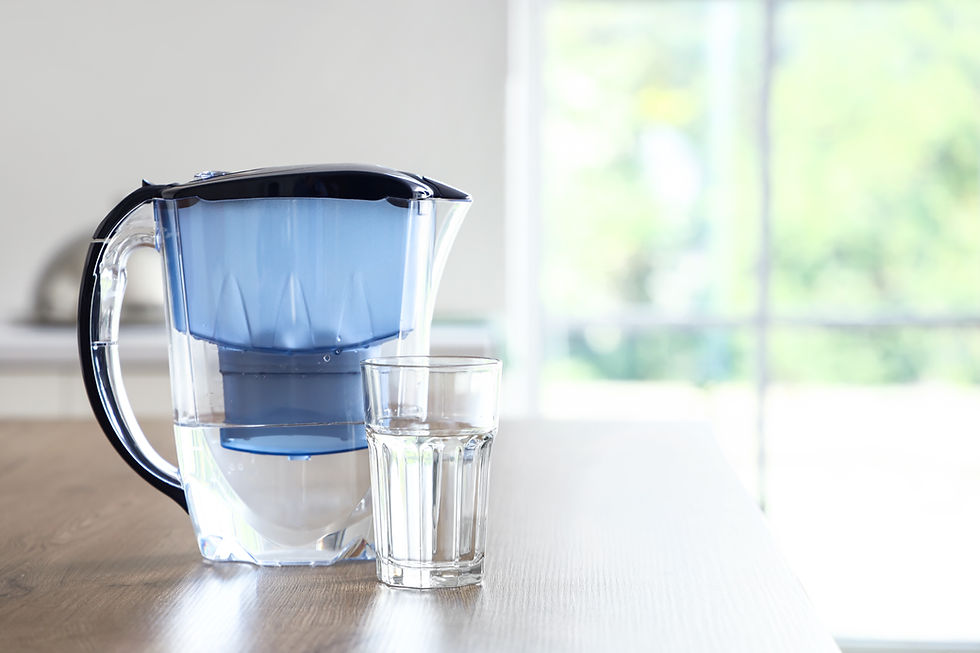Should my dog drink filtered water?
- Holmblad Water
- Sep 1, 2024
- 4 min read

As responsible pet owners, we take great care in selecting the right food, exercise routines, and veterinary care for our dogs. However, one critical aspect of their well-being that often goes unnoticed is the quality of the water they drink. Many of us fill our dogs' bowls with tap water, assuming it’s safe enough for the dog. But this assumption overlooks the potential risks that tap water, which may contain chlorine, heavy metals, pesticides, and other impurities, can pose to our pets.
Like us, a dog’s body contains 75% water. Water is just as vital to them as it is to us and it’s essential for all kinds of bodily function, including:
Regulation of body temperature (especially with all the running that dogs do!)
Keeping the skin elastic so you can cuddle your dog even more.
Lubrication of the joints so they play fetch with more speed!
Keeping the eyes, nose, mouth, and lungs moist so your pup can shower you with those face licks!
Cushioning the nervous system and organs
Flushing out waste products from the body
Helping in the digestion of protein, fat, and carbohydrates through hydrolysis
Dissolving and transporting nutrients to the cells
The Risks Associated with Tap Water Contaminants
1. Chlorine and Chloramine: Tap water is commonly treated with chlorine or chloramine to kill bacteria and pathogens. While effective, these chemicals can irritate your dog’s digestive system. Chlorine can cause gastrointestinal discomfort, leading to symptoms such as vomiting, diarrhea, and stomach pain. Prolonged exposure can also potentially affect your dog’s gut flora, disrupting their digestive health.
2. Heavy Metals: Tap water may contain traces of heavy metals such as lead, mercury, and arsenic, especially in areas with older plumbing systems or industrial pollution. Heavy metals can accumulate in your dog's body over time, leading to severe health problems. For instance, lead poisoning can cause neurological damage, kidney failure, and anemia. Even in small amounts, these metals can be toxic and pose significant risks to your dog’s well-being.
3. Pesticides and Herbicides: Agricultural runoff and other environmental factors can introduce pesticides and herbicides into the water supply. These chemicals are designed to kill pests and weeds, but when ingested by your dog, they can have toxic effects. Long-term exposure to pesticides has been linked to various health issues, including liver damage, reproductive problems, and an increased risk of cancer.
4. Other Impurities: In addition to chlorine, heavy metals, and pesticides, tap water can contain various other impurities, such as bacteria, viruses, and pharmaceutical residues. These contaminants, even in trace amounts, can accumulate in your dog’s system, potentially compromising their immune health and leading to chronic illnesses over time.
The Consequences of Not Using Filtered Water
1. Health Issues: Consistently providing your dog with water containing these contaminants can have potential health repercussions. Gastrointestinal problems are often the first signs of trouble, but the long-term risks are even more concerning. Chronic exposure to heavy metals and chemicals can lead to kidney and liver damage, neurological disorders, and an increased risk of developing cancers. These conditions are not only painful and debilitating for your dog but can also be costly to treat.
2. Dehydration: Many dogs are sensitive to the taste and smell of chlorinated water, which may deter them from drinking enough. This reluctance to drink can lead to dehydration, a condition that can have immediate and severe effects on your dog’s health. Dehydration can cause lethargy, kidney issues, and urinary tract infections, among other problems. Ensuring your dog stays well-hydrated is crucial, and filtered water can help encourage regular drinking.
3. Compromised Immune System: The immune system is your dog’s first line of defense against disease. Regular ingestion of harmful chemicals and heavy metals can weaken this defense, making your dog more susceptible to infections, allergies, and other health issues. A compromised immune system can also reduce their ability to recover from illnesses, leading to longer recovery times and more frequent veterinary visits.
4. Reduced Quality of Life: Ultimately, the cumulative effects of consuming contaminated tap water can lead to a reduced quality of life for your dog. Chronic health issues can cause discomfort, pain, and a decrease in their overall vitality. By providing filtered water, you help ensure that your dog enjoys a healthier, more active life, free from the preventable ailments associated with waterborne contaminants.
The Benefits of Filtered Water
Switching to filtered water for your dog can significantly reduce their exposure to harmful substances. Water filters are designed to remove chlorine, heavy metals, pesticides, and other impurities, providing your dog with cleaner, safer water. The benefits of filtered water include:
Improved Hydration: Filtered water often has a better taste and is more appealing to dogs, encouraging them to drink more and stay hydrated.
Better Digestion: Without the harsh chemicals found in tap water, your dog’s digestive system can function more smoothly, reducing the risk of gastrointestinal issues.
Long-Term Health: By eliminating contaminants from their water, you lower the risk of chronic health problems, supporting your dog’s overall longevity and well-being.
Enhanced Immune Function: Cleaner water supports a stronger immune system, helping your dog fight off infections and recover more quickly from illnesses.
Healthy and important minerals are preserved, but only when using an activated carbon filter.
Conclusion
The unique sensitivities of dogs make tap water a less ideal choice for their hydration. The presence of chlorine, heavy metals, pesticides, and other impurities can pose significant health risks to your dog, especially over time. By offering filtered water, you can protect your dog from these harmful substances, ensuring they remain healthy, hydrated, and happy. Investing in a water filter is a small change that can have a profound impact on your dog’s quality of life and long-term health.



Comments